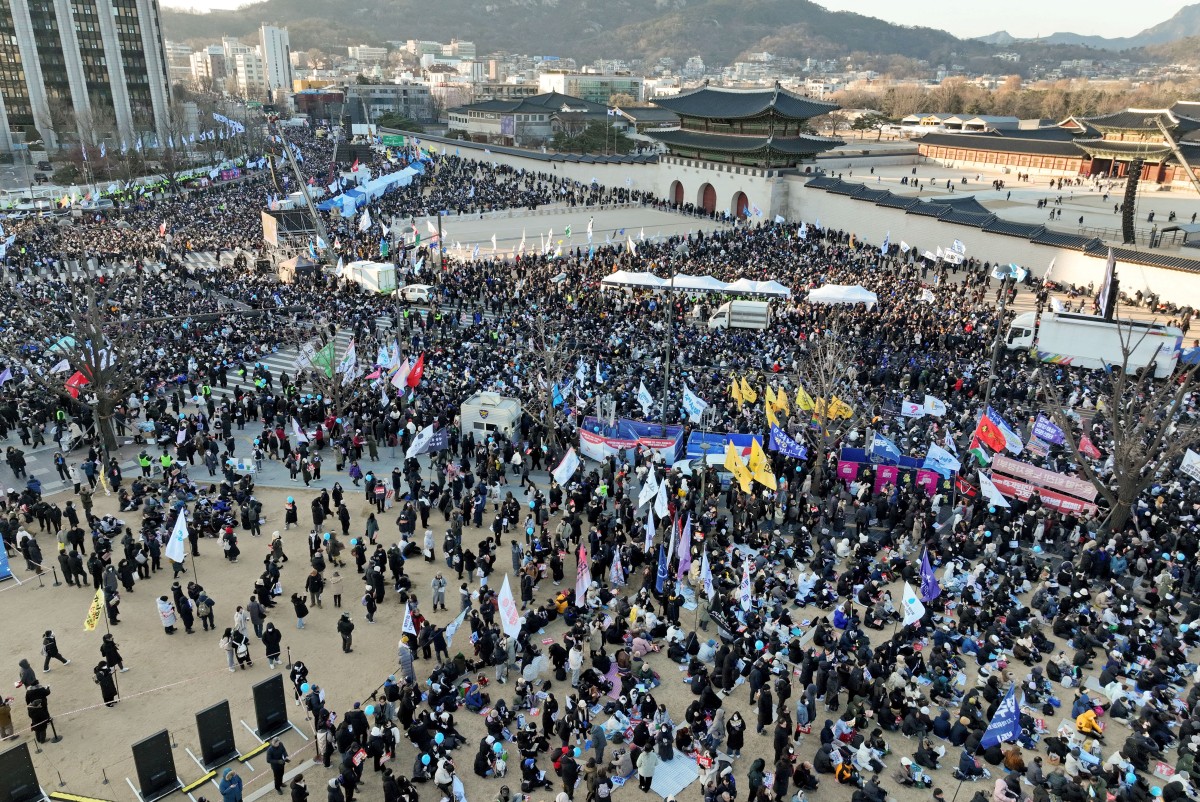S. Korea court issues arrest warrant for impeached president Yoon

Protesters take part in a rally calling for the ouster of South Korea’s impeached President Yoon Suk Yeol in front of the Gwanghwamun Gate of Gyeongbokgung Palace in Seoul on December 28, 2024. Agence France-Presse
SEOUL — A South Korean court has issued an arrest warrant for impeached, suspended President Yoon Suk Yeol, investigators said Tuesday, over his short-lived bid to impose martial law on the country.
“The arrest warrant and search warrant for President Yoon Suk Yeol, requested by the Joint Investigation Headquarters, were issued this morning,” the Joint Investigation Headquarters said in a statement.
“No schedule has been set for future proceedings,” it added.
READ: South Korea’s President Yoon impeached over martial law bid
Investigators probing Yoon over his declaration of martial law requested the warrant Monday after the suspended president failed to report for questioning a third time.
Article continues after this advertisementYoon briefly suspended civilian rule this month, plunging South Korea into its worst political crisis in decades.
Article continues after this advertisementHe was stripped of his presidential duties by parliament over the action, but a constitutional court ruling is pending on whether to confirm the impeachment.
The conservative leader also faces criminal charges of insurrection, which could result in life imprisonment or even the death penalty.
READ: S. Korean leader’s legal team says Yoon ‘did not commit insurrection’
The warrant was issued about 33 hours after it was requested — which local media claim is the “longest time in history for a warrant hearing”, indicating the court was debating how to proceed.
Even though the warrant has been issued, it is unclear whether investigators and police will be able to execute it.
The Presidential Security Service has previously refused to comply with three search warrants.
Police were deployed early Tuesday outside Yoon’s residence in central Seoul, in a likely bid to head off scuffles.
Yoon’s supporters and protesters calling for his removal have both staked out his residence, with local media running images of altercations between the two camps overnight.
Local media reported than an imminent arrest or search of the presidential residence was unlikely, as investigators would probably seek to coordinate with the presidential security service.
Technically, anyone obstructing the execution of an arrest warrant could be arrested.
Joint probe
Yoon is being investigated by prosecutors as well as a joint team comprising police, defense ministry, and anti-corruption officials.
A 10-page prosecutors’ report seen by AFP stated that Yoon authorized the military to fire weapons if needed to enter parliament during his failed martial law bid.
Yoon’s lawyer Yoon Kab-keun had dismissed the prosecutors’ report, telling AFP it was “a one-sided account that neither corresponds to objective circumstances nor common sense”.
Yoon declared martial law in an unannounced televised address on December 3, saying it was aimed at eliminating “anti-state elements”.
Lawmakers rushed to parliament within minutes of the declaration to vote it down.
At the same time, heavily armed troops stormed the building, scaling fences, smashing windows and landing by helicopter.
According to the prosecution indictment report, Yoon told the chief of the capital defense command, Lee Jin-woo, that military forces could shoot if necessary to enter the National Assembly.
The report also said there was evidence that Yoon had been discussing declaring martial law with senior military officials as early as March.
South Korea’s political turmoil deepened late last week when Yoon’s replacement, Han Duck-soo, was also impeached by parliament for failing to sign through bills for investigations into Yoon.
Finance Minister Choi Sang-mok has taken over as the new acting president, and found himself thrust immediately into a disaster with the Jeju Air plane crash Sunday that claimed 179 lives.